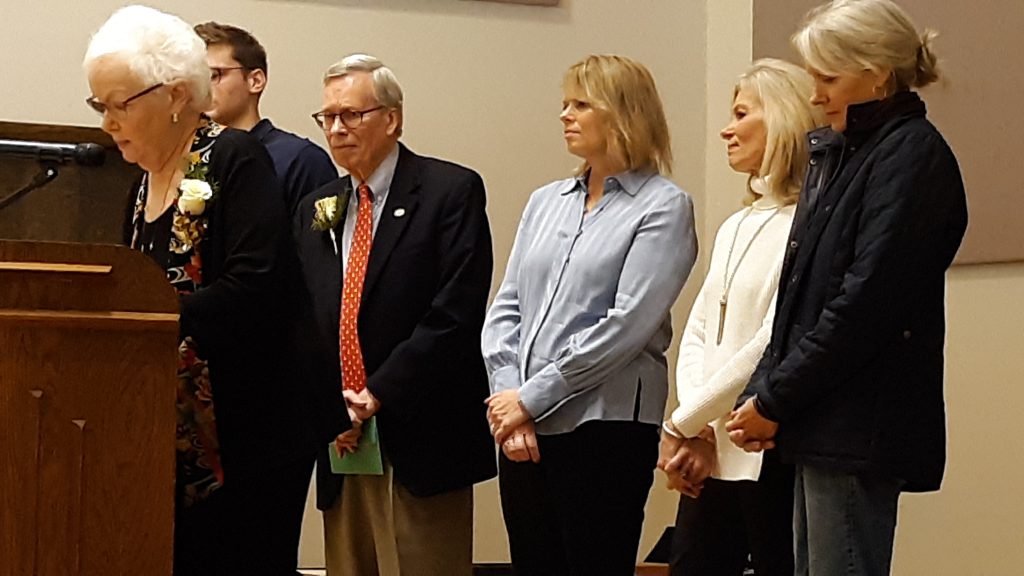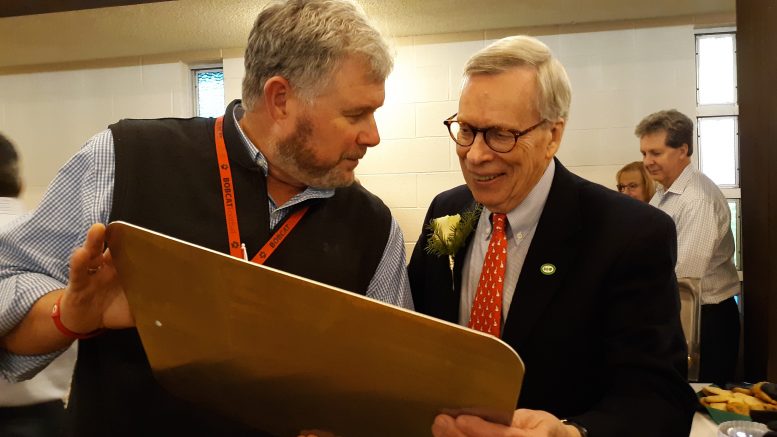By JAN LARSON McLAUGHLIN
BG Independent News
As Bowling Green mayor, Dick Edwards practiced decency in politics.
That waning skill was honored Wednesday as an overflow crowd filled the Simpson Building to wish the mayor well in his retirement.
True to form, the mayor graciously shared credit for all city successes with others who helped.
That lesson has not been lost on the next mayor, Mike Aspacher – who recalled Edward’s oft-recited quote from President Harry S. Truman: “It’s amazing what you can accomplish when you don’t care who gets the credit.”
Aspacher spoke of the “daunting task” ahead of him in filling the seat held by Edwards.
“I’m certain there will be phone calls that take place,” Aspacher said with a smile.
Edwards has served in the public sector for nearly 60 years. He began his career as a congressional staff member for Congressman Charles Mosher. He then worked for the director of the National Science Foundation, and served as the executive officer of four public universities, including BGSU from 1971 to 1984.
He returned to Bowling Green in 1994 and served as the Wood County administrator until 2000. He began his first term as mayor on Jan. 1, 2012, and was re-elected for a second term in 2015.
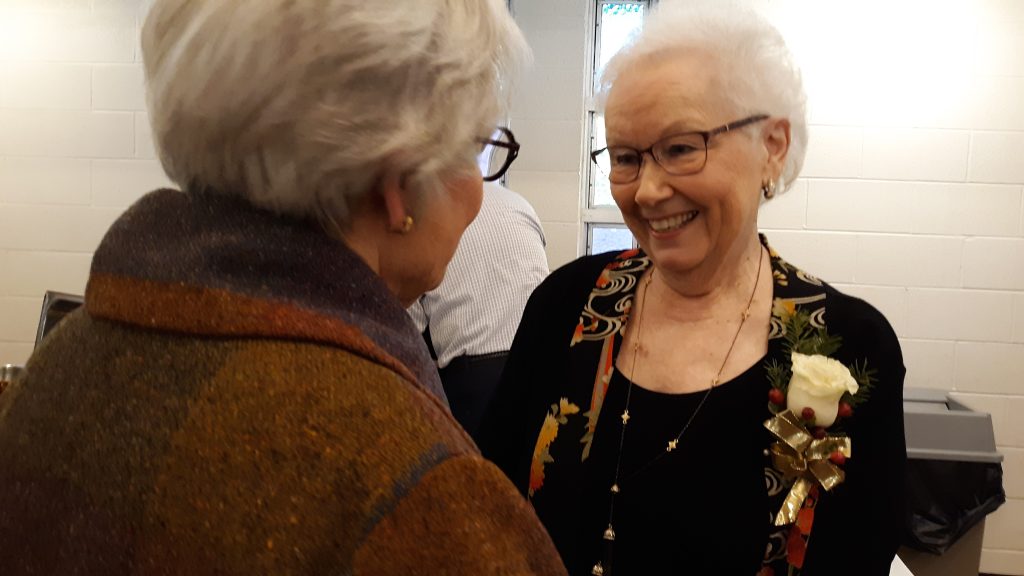
Edwards and his wife, Nadine, came as a package deal. For nearly 60 years they have worked as a team on projects like Wooster Green and Simpson Garden Park.
Nadine Edwards has been a constant at city council meetings – both to show support and better understand the workings of the city. Like any spouse of a public official, she tolerated frequent phone calls at home and interruptions when out in public.
The Edwards were honored individually in 2008 as “Outstanding Citizens of the Year” by the BG Chamber of Commerce and became the first couple to be so named.
As mayor, Edwards practiced an unusual level of politeness when faced with disagreements. The strongest language his staff heard him use was “dumb bunny” – and that was about himself, Municipal Administrator Lori Tretter said.
But those who interpreted that pleasant demeanor as the sign of a pushover were frequently proven wrong.
Edwards remained contained even when confronted by the Nexus pipeline controversy, complaints about parking kiosks, neighbors tired of tall grass at Simpson Garden Park, and seemingly endless downtown construction. Somehow he stayed composed when a person of authority suggested that Oak Grove Cemetery be moved to make room for BGSU development, Tretter said.
The mayor also has the uncanny ability to make connections with almost anyone. He puts Kevin Bacon’s “six degrees of separation,” to shame – with his knack at finding something in common with people. That may be his Scottish roots, his Bellevue hometown, higher education, music, sports, government, travels.
“He can always find common ground,” Tretter said.
And once he finds it, he remembers it.
Political party seemed to mean little to Edwards, a Republican, who just tried to do the right thing, and tried to work with anyone to accomplish that. That meant standing up to state officials – sometimes of the same party – who the mayor felt were harming cities by usurping home rule and draining budgets of Local Government Fund cuts.
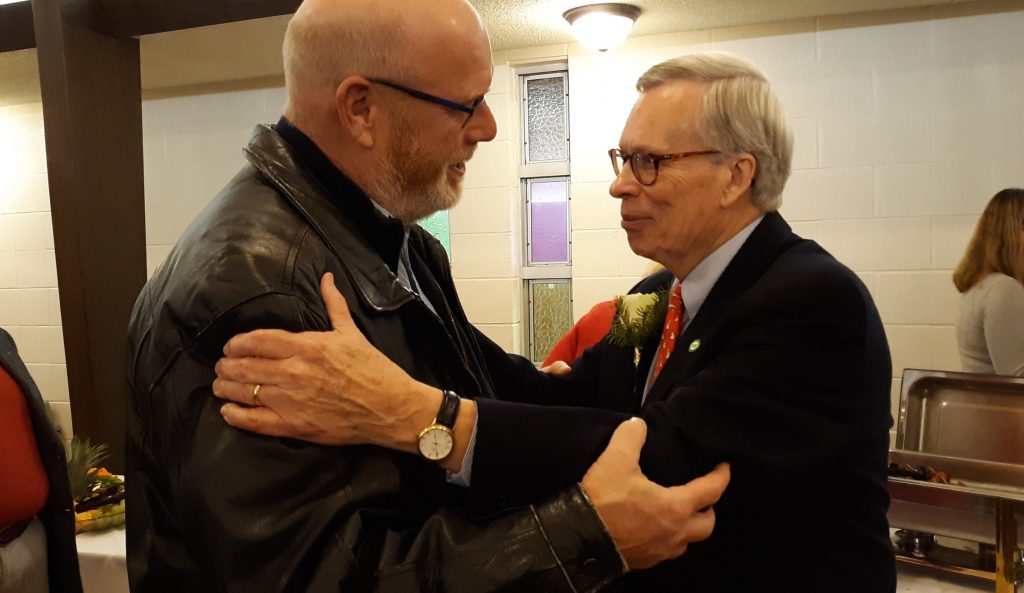
His early career in government reaches back to the Kennedy presidency, when he served as legislative assistant to Congressman Charles Mosher – a former newspaper man.
Edwards still has sharp memories of attending President John F. Kennedy’s press conferences – including the one he took Nadine to right before Kennedy’s assassination.
The day Kennedy was killed, Edwards and Mosher had a meeting scheduled with Hugh Dryden, the deputy administrator at NASA. When they arrived, Dryden was too distressed to hold the meeting.
“People were absolutely stunned in Washington,” Edwards said. “Everything came to a screeching halt. It was an eerie feeling. People were overwhelmed with grief. Politics meant nothing.”
Raised in Bellevue with a newspaper man for a father, Edwards knows the importance of making information available to citizens. Growing up with the newspaper as his second home taught him to value journalism as a conduit between government and the people.
His values showed in where he focused his attention.
The mayor was troubled when seeing racial hatred and discrimination occur in the city, so he helped start the Not In Our Town movement. Years later, he again was concerned to see the nation’s administration move to turn away immigrants. Edwards spoke of his family coming to America when the circumstances were much different, and lamented the fact that many were now being denied the American dream.
Edwards saw the potential in the empty lot where the junior high previously sat. He patiently pushed for progress changing the site to Wooster Green, where citizens could meet to celebrate joys and gather to grieve tragedies.
When a pipeline was proposed to run near the city’s water treatment plant, Edwards’ belief in science led him to insist on answers prior to giving the pipeline a pass. He warned the pipeline company that Bowling Green officials would be watching.
When the mayor became aware that the National Day of Prayer event had been hijacked by a very conservative Christian faction that would only allow like-minded Christians to participate, he refused to continue participating in the event that so many people were banned from joining.
He fought to preserve history worth saving, and pushed for change that would benefit citizens. When citizens balked at the addition of roundabouts on the east side, the mayor assured residents that they could adapt to the change.
He supported the city’s work to create more green energy sources – now totaling 40 percent of the city’s energy. He realized the value of combining all the city’s economic development offices into one location at Four Corners.
Edwards was equally at home on campus as in the community. He thrilled at the opportunity to meet with BGSU students and make them feel at home in Bowling Green. At the beginning of every fall semester, the mayor would join the BGSU president and walk door-to-door in the neighborhoods along East Wooster Street.
The greeting was intended to be a warm welcome, but also a warning to be good neighbors to full-time residents. Edward’s ability to make immediate connections with students netted him several offers of cold beers or even a chance to try a “slip-n-slide” in the front yard of a rental unit.
A lifelong learner, Edwards in later years, started taking alto saxophone lessons at the university. He’s still a member of the Bowling Green Area Community Band.
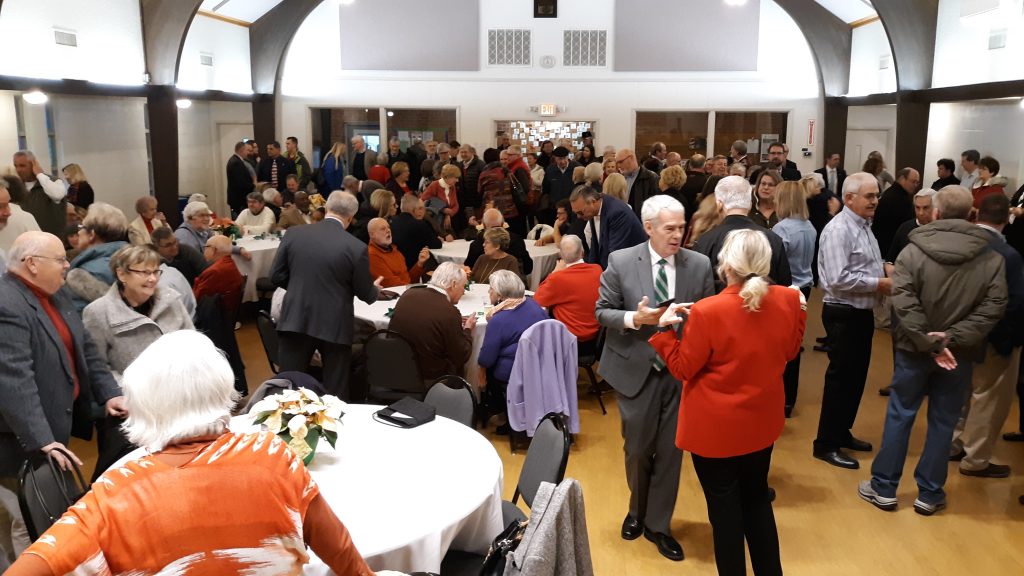
As the community gathered to honor the mayor on Wednesday, Ohio Higher Education Chancellor Randy Gardner joked that he had to park outside city limits because the crowd was so large.
“They’re here because they appreciate what you’ve done for so many people for so long,” Gardner said.
Edwards was praised not just for serving his residents, but for his skill of giving others the confidence to take roles in the community. Wood County Commissioner Doris Herringshaw talked about the mayor convincing her to take a leadership role in TMACOG.
“He’s the force that gets us moving in the direction he thinks we fit best,” Herringshaw said.
The mayor’s fingerprints can be seen on many city projects of the last eight years – and many positive relationships formed.
“This is a legacy that will impact our community for years to come,” Tretter said.
